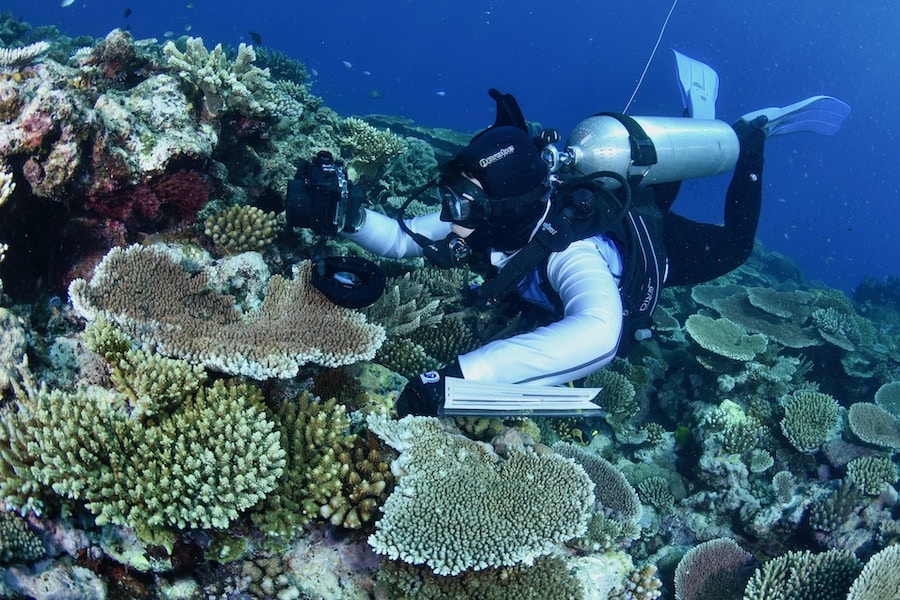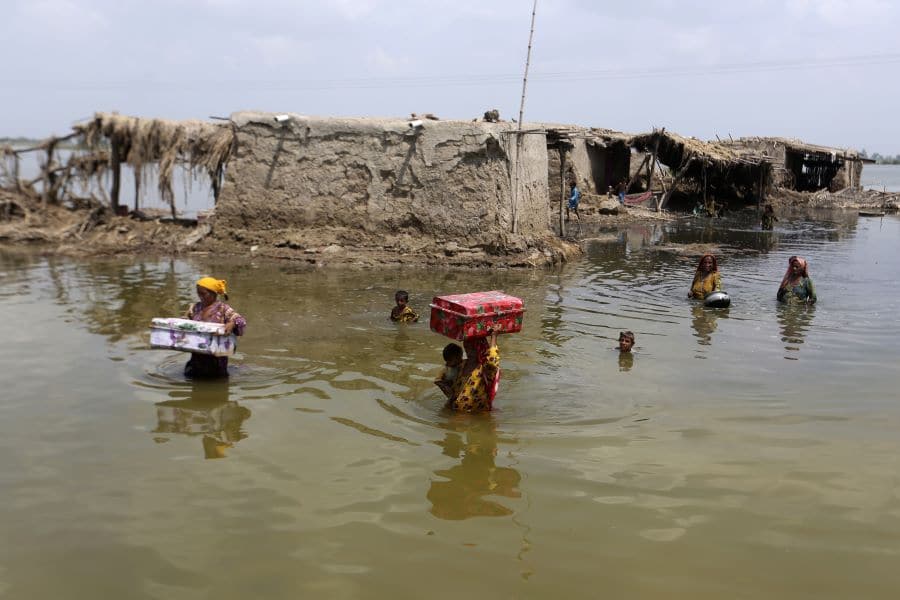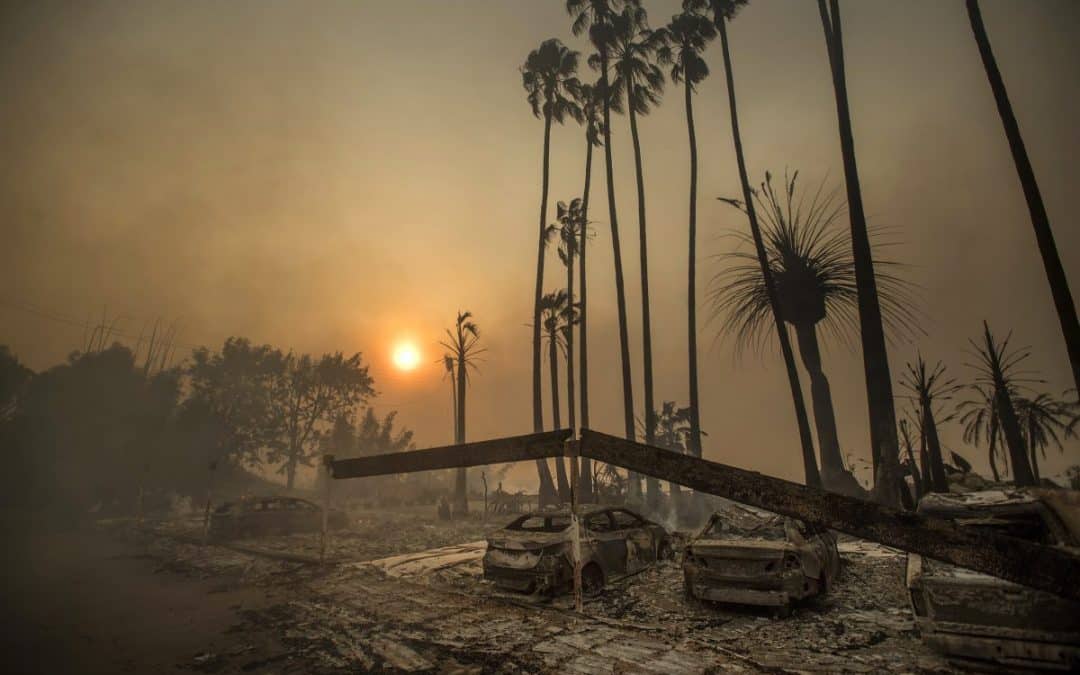
by Richard Hubbard | 13 Feb 2023 | Climate decoders, Decoders, Economy, Educators' Catalog, Environment, Writing's on the Wall
The Great Barrier Reef isn’t just an endangered world wonder. Protecting the world’s largest coral reef system is also key to Australia’s economic growth. A diver swims past coral on the Great Barrier Reef in Australia, 18 October 2016. More than 90%...
Protecting the environment isn’t just the right thing to do, it can also be the profitable thing to do. Take the Great Barrier Reef, for example, which has an estimated value of $56 billion Australian dollars. Help your students disentangle the complicated world of environmental economics with this article.
Exercise: After reading the article, have students take the WWF Carbon Footprint questionnaire at https://footprint.wwf.org.uk/#/. The questionnaire estimates individuals’ carbon footprint, looking at food, travel, home and consumption habits. After the questionnaire, launch a class discussion on how changes in individual habits may contribute to fighting climate change — and might even be a profitable choice.

by Betty Wong | 5 Jan 2023 | Climate decoders, Economy, Educators' Catalog, Environment, Writing's on the Wall
Turn on the tap, and the world’s most valuable commodity pours out. Maybe it’s time to invest in water — to line our pockets and protect our planet. Clean water pours from a hose. Credit: Cassio Henrique. Getty Images. This article is the seventh in a...
Water is one of the most important commodities in the world. It is also tradable as companies seek to make money by purifying and distributing it. Some organizations that are pushing for climate change action are investing in water companies to pressure private industry to be better stewards of water. These investments in water stocks are proving to be financially profitable.
Exercise: The story identifies a list of companies that provide water or water infrastructure: IDEX Corp., Xylem Inc., Danaher Corp., Ecolab, Roper Industries, Pentair Plc, Ferguson Plc and American Water Works Co. Inc. Divide students into investment teams with $1 million each to invest. Have them first brainstorm ways water and systems for providing water could be improved in their area or elsewhere. Then have them look up the website of one or more of those companies to see if they can tell what the company does to improve water supply or quality. Would their $1 million invested in that company help towards the improvements they identified as needed?

by Tira Shubart | 14 Dec 2022 | Climate decoders, Educators' Catalog, Science, Space, Writing's on the Wall
Oh Tang! If our seas rise too high there are exoplanets to settle. But hope you like freeze-dried food, because it’s a long trip out there. This illustration shows a fictional astronaut on Mars, as viewed through the window of a spacecraft. (NASA/JPL-Caltech)...
Fearing the prospect that our seas will rise and our climate will get too hot to make life comfortable on Earth, some smart people are thinking about new homes in outer space. But is there a so-called Planet B we could actually reach in a spaceship and what would life be like there? In an entertaining article that takes us through time and space, correspondent Tira Shubart explores these possibilities and comes to the conclusion that maybe we should concentrate our money and energy on cleaning up our own backyard.
Exercise: Shubart tells us that it is unlikely that Mars could be made habitable for humans. But let’s say that your students could come up with the technology that would make that possible. What would they need to produce to make Mars a place where people could live? Have them brainstorm a list of devices that would solve the problems Shubart discusses in the article. Then ask them to come up with a list of ways we could clean up our environment on earth.

by Deborah Charles | 29 Nov 2022 | Climate decoders, Decoders, Environment, World, Writing's on the Wall
Food systems contribute greatly to climate change. Cooling the planet might require shaking up our meal plans. Substitute meat brands at a supermarket in Westchester County, New York, 16 February 2021. (STRF/STAR MAX/IPx) This article is the fifth in a series of...

by Sue Landau | 22 Nov 2022 | Climate decoders, Decoders, Environment, Writing's on the Wall
It’s not too late to switch from fossil fuels to renewable energy, decarbonize industry and adapt land-use to trap carbon in soil and plants. A solar panel sits near a street in Lagos, Nigeria, 20 August 2022. (AP Photo/Sunday Alamba) This article is the fourth...

by Jeremy Lovell | 9 Nov 2022 | Climate decoders, Decoders, Educators' Catalog, Environment, Writing's on the Wall
Climate change requires global, systemic action if we are to save Earth. But each of us can help bring pressure for the painful changes needed. Greta Thunberg at a climate strike outside the United Nations in New York, 30 August 2019 (AP Photo/Bebeto Matthews) This...
Can one person’s actions really help save our planet? The news on climate science is often bleak but Correspondent Jeremy Lovell tells us why we should each think of ourselves as one of a billion climate activists environmental advocate Greta Thunberg seeks to mobilize. And together we can push governments and corporations for changes that can save our planet.
Exercise: Have students come up with a short list of steps they think your national or regional government should and could take to fight climate change. Have each student write a letter to the president or your governor asking them to push for legislation that would accomplish this.

by Malcolm Davidson | 25 Oct 2022 | Climate decoders, Decoders, Environment, Writing's on the Wall
At next month’s climate summit in Egypt, poorer nations coping with disasters will press wealthier states for a fund to help them ride out catastrophes. Women carry belongings from their flooded home in the Qambar Shahdadkot district of Sindh Province of...

by Alister Doyle | 17 Oct 2022 | Climate decoders, Decoders, Environment, Middle East, Politics, World, Writing's on the Wall
For years, governments have engaged in marathon annual talks to try to end global warming. But they often fall frustratingly short. Egypt will host COP27 in November at the Red Sea coastal resort of Sharm el-Sheikh. Rising sea levels caused by climate change are...

by Robert Hart | 12 Nov 2019 | Climate decoders, Decoders, Environment
The next push to combat climate change comes soon in Spain, when more than 190 countries meet to tackle global warming. Here’s what to expect. Smoke rises behind a destroyed apartment complex, Ventura, California, 5 December 2017 (AP Photo/Noah Berger) At the...
by Sue Landau | 26 Aug 2019 | Climate decoders, Environment
The climate crisis is everywhere now, but so are initiatives to cope with it and counter it. That is perhaps the biggest positive change since the 2015 Paris Climate Accord. You can see this just by watching television or Internet news, reading the most informative...









